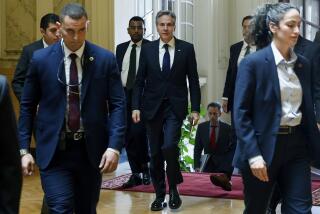Reluctant U.S. says Libya no-fly zone would have little effect
Even as the Obama administration insists that a no-fly zone remains an option, a senior U.S. envoy said Monday that directing Western militaries to suppress Libyan air attacks on rebels would not have a great effect on the conflict.
Ivo H. Daalder, the U.S. ambassador to the North Atlantic Treaty Organization, told reporters that the number of Libyan air force flights has been decreasing after a peak last week. And, he added, it is hard to suppress helicopter attacks using such a tactic.
“No-fly zones are more effective against fighters, but they really have a limited effect against … helicopters or the kind of ground operations that we’ve seen,” he said. “Which is why a no-fly zone, even if it were to be established, isn’t really going to impact what is happening there today.”
The idea of a no-fly zone has become the most widely discussed military option in dealing with the violence. In recent days U.S. lawmakers from both parties have urged the Obama administration to adopt it. But a succession of administration officials, including Defense Secretary Robert M. Gates, have said it would require substantial efforts for limited results.
Reports in recent days from eastern Libya have suggested that air attacks by government forces played a substantial role in a counteroffensive that pushed back the badly armed and poorly organized rebel force. Libyan leader Moammar Kadafi’s forces launched airstrikes near an oil complex in Ras Lanuf, located near the front line. News reports said a town deep in rebel-held territory also was hit Monday.
Arab countries in the Gulf Cooperation Council called Monday for imposition of a no-fly zone.
President Obama, in an appearance Monday at the White House, declined to answer specific questions about that issue. But he said NATO officials were considering “a wide range of potential options, including military options” as they meet this week in Brussels.
With the United Nations estimating that the death toll in Libya has risen past 1,000, U.S. and allied officials are under increasing pressure to act. But Obama administration officials are deeply reluctant to use force, fearing open-ended involvement and a negative Arab reaction to another Western military incursion in the Middle East.
Nevertheless, U.S. and European officials say they continue to plan for possible military involvement. Daalder said NATO was planning to increase the use of its AWACS surveillance aircraft, to keep an eye on Libya’s use of military planes.
U.S. officials are giving top priority to efforts to persuade Kadafi’s lieutenants to give up the fight. U.S. and allied officials have been trying to send messages to generals and aides warning that they could face criminal charges if they remain loyal to him.
Jay Carney, the White House press secretary, said Monday that U.S. officials were working hard to identify those people.
“We are using the full spectrum of our intelligence capabilities to assist us in identifying those who must be held accountable for the actions that they’re taking,” he said.
Carney stopped short of denying a report in the British newspaper the Independent that the administration was encouraging Saudi Arabia to arm the Libyan rebels.
Asked repeatedly whether the report was true, Carney said: “I would simply say that the option of providing military assistance is on the table because no options have been removed from the table. I won’t get into the means … by which that would occur.”
Times staff writers Christi Parsons and Michael A. Memoli contributed to this report.
More to Read
Get the L.A. Times Politics newsletter
Deeply reported insights into legislation, politics and policy from Sacramento, Washington and beyond. In your inbox three times per week.
You may occasionally receive promotional content from the Los Angeles Times.







